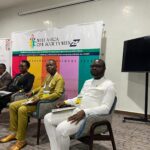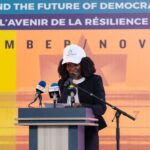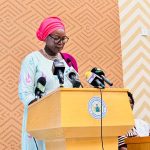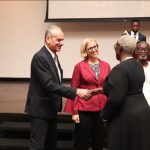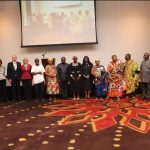
Spaces for Change (S4C) opened the 3rd West Africa Civil Society Week (WACS Week) with a strong call for collective regional action to protect civic freedoms, spotlighting the escalating threats undermining civil society across the region.
The two-day event, held in Accra from 19–20 November 2025, drew over 300 participants from more than 10 West African countries.
Speaking on behalf of Victoria Ohaeri-Ibezim, Executive Director of Spaces for Change, Sola Sam-Adeniyi, Team Lead at S4C, delivered a compelling intervention that set the tone for the gathering.
In her remarks, she described the civic landscape as increasingly volatile, shaped by violent extremism, tightened restrictions, digital repression, and dwindling avenues for free expression and association.
“We are witnessing civic space shrink at a disturbing pace,” she warned. “Across West Africa, activists, journalists, and community groups continue to face intimidation, arbitrary regulations, and outright violence. Despite these threats, communities are not silent. But for their voices to be sustained, solutions must emerge from within—rooted in local realities and informed by the lived experiences of those on the frontlines.”
Sola Sam-Adeniyi emphasized the urgency of locally driven strategies that strengthen citizen-led governance, deepen grassroots leadership, and rebuild public trust.
“Strengthening capacities, investing in community actors, and creating safe spaces for collaboration are no longer optional—they are the pillars of survival for civil society,” she added.
Highlighting S4C’s regional initiative, she noted that the Weaving Resilience network offers a practical model for confronting civic space challenges through inter-organizational solidarity, cross-border learning, and long-term movement building.
“The Weaving Resilience network shows that when we learn together, defend one another, and mobilize as a collective, our movements become more resilient and harder to silence,” she said.
“Resilience is our shared agenda and our most powerful response to repression.”
The concerns raised by Spaces for Change were echoed across the opening session.
The ECOWAS Commissioner for Political Affairs, Peace, and Security, Ambassador Abdel-Fatau Musah (PhD), cautioned that democracy in West Africa is under serious threat.
He cited worsening insecurity, declining governance standards, and shrinking civic space, describing civil society as the “people’s megaphone” in advancing accountability, constitutional order, and electoral integrity.
Joining remotely from Abuja, H.E. Mohamed Ibn Chambas, African Union High Representative for Silencing the Guns, stressed that democracy must deliver real benefits—education, health, and social protection—rather than being reduced to periodic elections.
He challenged civil society groups to harness technology responsibly to expand participation and improve accountability.
Dr. Nana Afadzinu, Executive Director of WACSI, urged civil society organizations to reclaim their credibility through transparency, community accountability, and value-driven work.
She called for resilient funding, stronger institutions, and coalitions capable of resisting political pressures.
Delivering a speech on behalf of Dr. Catherine Chinedum Aniagolu-Okoye, Regional Director of Ford Foundation West Africa, Onyinye Onyemobi reiterated the foundational role of civic actors in sustaining democratic values.

She emphasized that an empowered civil society is “the backbone of democracy,” calling on participants to reflect on leadership, solidarity, and civic infrastructure. She reminded the audience that “hope is the oxygen of democracy.”
Nana Oye Bampoe Addo, Deputy Chief of Staff to the President of Ghana, described civil society as the heartbeat of a thriving democracy, advocating for ethical practices, smart civic technology adoption, multi-stakeholder engagement, and research-driven peacebuilding across the region.
Key Takeaways from WACS Week 2025 Redefining Civic Space: CSOs must strengthen community-centered accountability and rebuild trust with grassroots constituencies.
Building Resilience: Sustainable funding models, strategic partnerships, and deeper institutional capacity are essential.
Youth and Women Inclusion: Their roles remain central to shaping civic space and driving democratic participation.
Technology & Collaboration: Responsible use of digital tools can widen civic engagement and reinforce accountability.
Governance & Accountability: Judicial reforms, community-led governance, and regional integration are vital to tackling corruption and advancing sustainable development.
The two-day convening reaffirmed that a resilient, empowered, and community-rooted civil society is indispensable for safeguarding democracy in West Africa.
Co-hosted by the West Africa Civil Society Institute (WACSI) and Spaces for Change (S4C), with support from the Ford Foundation and other partners, the 2025 edition attracted hundreds of civil society actors, activists, policy experts, and youth leaders from across the sub-region.
The West Africa Civil Society Week (WACS) is an annual convening that examines the state of civic space within the region and charts practical pathways for stronger civil society effectiveness and democratic resilience.

Building on the maiden edition in Lagos (2023), which highlighted the rapid deterioration of civic space and identified priority areas for capacity strengthening and targeted interventions, and the second edition in Abuja (2024), which interrogated the double-edged role of technology and the evolving responsibilities of civil society in West Africa, the third edition—WACS Accra 2025—returns at a moment of critical regional inflection, as civic space conditions grow increasingly fragile and demands for collective action intensify.



